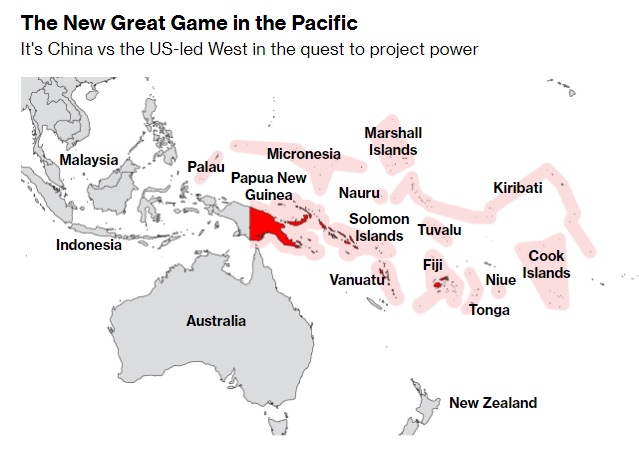
America’s contest with China will be decided in lots of places — including Tonga, writes Bloomberg.
Just hitch a mental ride with Kurt Campbell, America’s deputy secretary of state, as he alights this week in that archipelagic kingdom for a summit of the Pacific Islands Forum. The purpose of his trip is to woo that club’s 18 members while — as usual these days — outcharming a top diplomat from China who’s also in attendance,
Campbell and that envoy from Beijing, Qian Bo, are each showing up in Nuku’alofa with a bagful of carrots and sticks to make the case that their respective nation is the better partner for Pacific nations. In that way, the forum, in what is a peripheral region on most maps, has become central to the geopolitics of our time.
This area of Oceania won’t become the equivalent of the Berlin Wall during the Cold War of the 20th century — that’s more likely to be the Taiwan Strait, or some other part of what Beijing considers its “first island chain.” According to the Lowy Institute, a think tank in Australia, the Pacific is instead analogous to Central Asia during the 19th century, when the Russian and British empires struggled for influence and primacy in a contest called the Great Game.
Today’s Great Game is a tug-of-war with the US and its allies — including Australia and New Zealand, both members of the Pacific Islands Forum — on one side, and China and its emerging “axis” of Russia, North Korea and Iran on the other. The game board is the globe, from the conflict zones of Eurasia to the Arctic and Africa. But the Pacific is among the board’s most valuable real estate.
Strategically, the region — straddling Micronesia, Melanesia, Polynesia and Australasia — abuts the “second island chain,” along which Washington has permanent aircraft carriers in the form of Guam, the Northern Marianas and American Samoa. With Washington’s blessing, these US territories are applying to join the forum as associate members. More generally, many of the world’s most important shipping and supply lanes crisscross these waters, while fiber-optic cables line the seabeds underneath.
That’s why China has been eager to hold the Americans at bay while planting its own flags. Beijing has been opening new diplomatic missions, offering loans and promising to build ports and sundry infrastructure projects, among other largesse. This courtship has met with some success. China has wheedled three members of the forum — the Solomon Islands, Kiribati and Nauru — into switching their diplomatic recognition from Taipei to Beijing; only three others (the Marshall Islands, Palau and Tuvalu) are nominally still on Taiwan’s side.
But what really got the attention of top brass from Washington to Canberra and Wellington was a security pact that China signed in 2022 with the Solomon Islands (memorable to Americans as the site of the Battle of Guadalcanal, where they turned the tide against the Japanese in World War II). People like Campbell, also known as President Joe Biden’s “Asia czar,” are now trying to shore up other partners in turn, such as Papua New Guinea.
The countries in the forum are well aware of their new rizz with the Great Powers. But like other nations in the so-called Global South, from India to South Africa and Brazil, they’re not keen to take sides in a clash of titans. Besides, the West’s imperialist past casts long shadows. The troubles of New Caledonia, a French territory where independence protesters have been rioting, are high on this week’s summit agenda.
The islands also suffer other problems common to the Global South, including high debt, poverty, corruption and crime. Above all, they’re among the places most at risk of climate change, as rising seas inundate their coastlines, storms become more frequent and deadly, coral reefs bleach and fish stocks dwindle.
Campbell gets all that and understands that the US must offer genuine and long-term help in return for support in the Pacific. Then again, everybody at the forum knows that he, along with the Biden administration, is on the way out, whereas China’s leaders are there to stay.
Vice President Kamala Harris has made clear that she values American alliances and sees the United States as world leader. Should she win, she’ll probably make good on whatever Campbell promises at the forum. Donald Trump, for his part, increased aid to the Pacific nations in his first term. But he takes a transactional approach to existing and potential partner countries, leans isolationist and pooh-poohs global warming.
Pacific islanders are used to watching the vagaries of Washington and fed up with cleaning up the flotsam and jetsam. The United States has long struck the wrong notes in the region, where it has neglected even its own territories. On the subject of Papua New Guinea the other day, even Biden bizarrely confabulated about an uncle being eaten by cannibals there; its prime minister was not amused…
read more in our Telegram-channel https://t.me/The_International_Affairs

 12:20 02.09.2024 •
12:20 02.09.2024 •






















